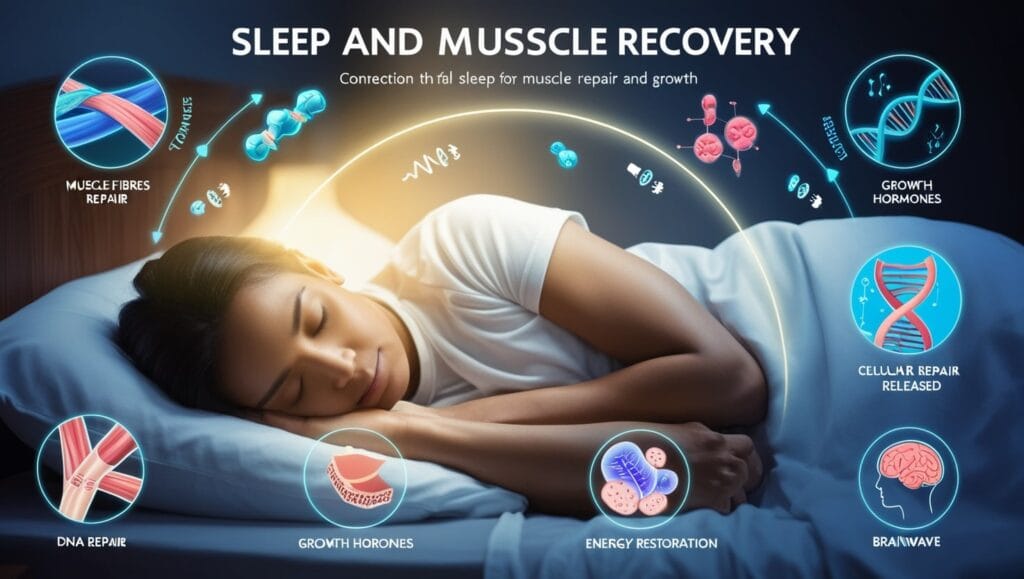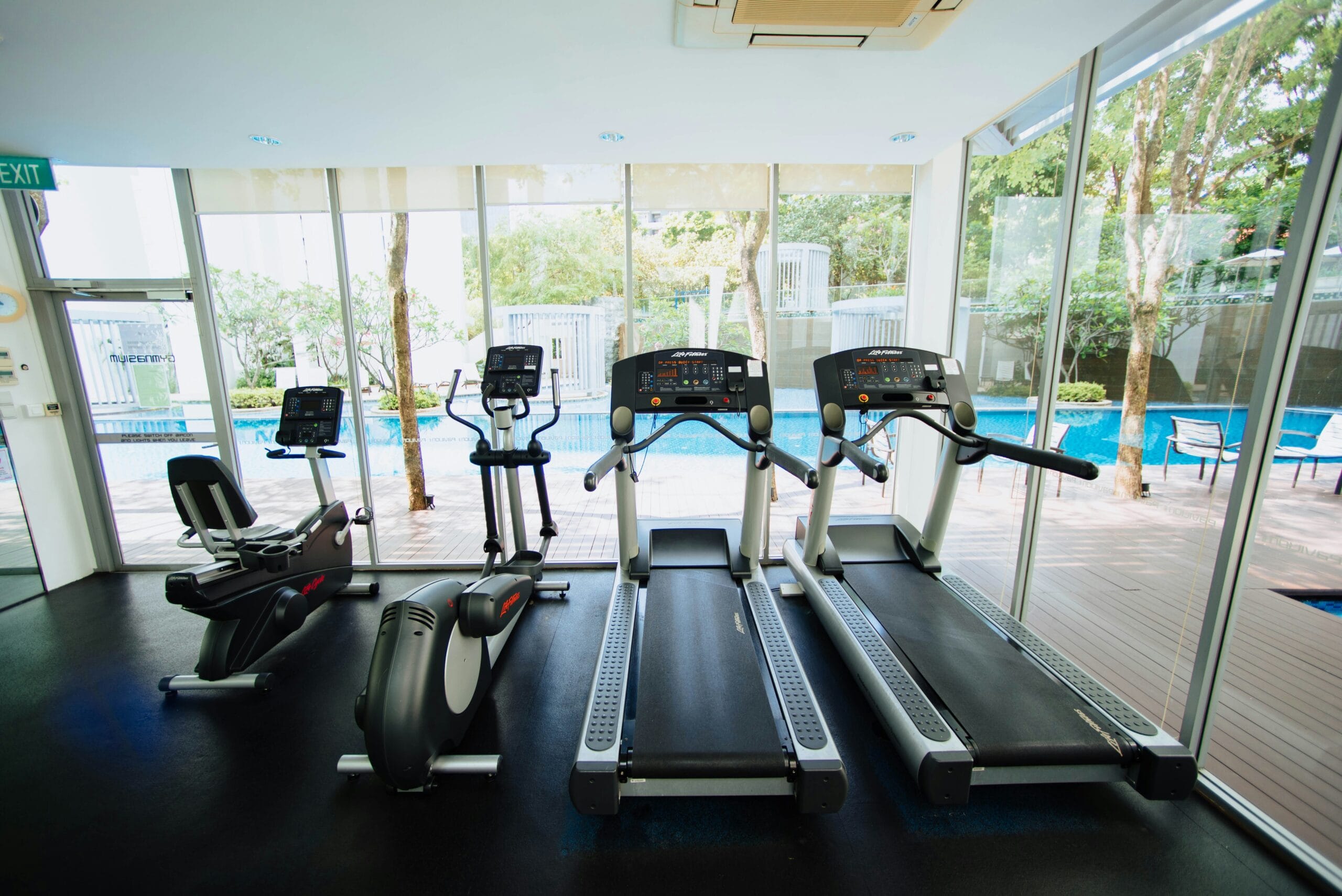
Introduction
In the pursuit of better fitness and strength, most people focus on perfecting their exercise routines and diets. However, an equally important but often overlooked aspect of fitness is sleep. Sleep plays a crucial role in muscle recovery, and without it, your body cannot repair the micro-tears in muscle fibers caused by intense workouts. This article will explore why sleep is essential for muscle recovery and how you can optimize your rest for better fitness results.
When it comes to building muscle and improving strength, most people focus on workouts and diets.
But what often gets overlooked is one of the most powerful tools for recovery—sleep.
Sleep isn’t just about resting.
It’s the time when your body does its most important repair work.
Muscle fibers damaged during exercise are rebuilt stronger, and energy stores are replenished.
Without enough sleep, your body struggles to recover, and this can lead to slower progress, increased fatigue, and even injury.
On the other hand, quality sleep boosts muscle growth, improves focus, and keeps your energy levels high.
Think of sleep as the reset button for your body.
It’s when hormones like growth hormone and testosterone are released—both critical for muscle repair and development.
Whether you’re just starting your fitness journey or pushing through intense workouts, making sleep a priority can make all the difference.
It’s not just about how hard you work in the gym—it’s also about how well you rest afterward.
Give your body the recovery it needs, and you’ll wake up stronger, healthier, and ready to tackle the next challenge.

What is Muscle Recovery?
Muscle recovery is the process through which your body repairs and rebuilds muscle tissue after a workout.
It’s when your muscles recover from the strain and stress of exercise, becoming stronger and more resilient.
During intense physical activity, muscles experience tiny tears.
While this might sound painful, it’s actually a natural and necessary part of muscle growth.
After your workout, your body shifts into recovery mode.
This is when your body works to heal those muscle fibers, making them thicker and more capable of handling future workouts.
Muscle recovery isn’t just about rest—it’s about giving your muscles the fuel and time they need to repair.
Proper nutrition, hydration, and rest all contribute to the recovery process.
The more effectively you recover, the stronger and more capable your muscles become.
And without recovery, you risk overtraining, injury, and even a plateau in your fitness progress.
So, muscle recovery is a key element of any successful fitness journey.
It allows you to train harder, perform better, and achieve lasting strength.
Muscle recovery is the process your body goes through to repair and rebuild muscles after a workout.
When you exercise, especially during strength training, tiny tears form in your muscle fibers.
This might sound alarming, but it’s actually a good thing.
These small tears trigger your body to repair and strengthen the muscles, making them bigger, stronger, and more resilient.
Recovery doesn’t just happen during rest—it’s an active process that involves proper nutrition, hydration, and most importantly, sleep.
Without giving your muscles enough time to recover, you risk overtraining, fatigue, and even injury.
It’s during recovery that real growth happens.
The hard work you put in during your workouts pays off only if you allow your body to heal and rebuild.
Whether it’s through stretching, light movement, or just taking a rest day, muscle recovery is what turns effort into results.
Muscle recovery refers to the process where the body repairs and strengthens muscle tissue after exercise. During intense exercise, the muscles undergo stress, creating small tears in the muscle fibers. These tears are then repaired during periods of rest, resulting in stronger, more flexible muscles. If the recovery process is not given adequate time or rest, muscle growth can stop, and you are at risk of injury.

The Science of Sleep and Muscle Recovery
Sleep isn’t just downtime for your body—it’s when the real work of recovery happens.
While you’re resting, your body is hard at work repairing muscle tissue, restoring energy levels, and balancing hormones.
During deep sleep, growth hormone levels spike.
This hormone plays a key role in rebuilding muscle fibers that are broken down during exercise.
It also helps your body build new proteins, which are the building blocks for stronger muscles.
At the same time, cortisol—the stress hormone—drops, allowing your body to relax and recover fully.
This balance between growth and repair is what keeps your muscles healthy and ready for the next workout.
Lack of sleep, on the other hand, throws this process off balance.
It can lead to muscle breakdown, slower recovery, and even reduced performance during your workouts.
So if you’re serious about building strength and staying consistent, prioritize quality sleep.
It’s not just about how hard you train—it’s about how well you let your body recover afterward.
One of the key factors in muscle recovery is the release of growth hormone, which occurs primarily during deep sleep. This hormone plays an important role in repairing damaged muscle tissue and promoting overall growth. Conversely, lack of sleep increases levels of cortisol, a stress hormone that hinders muscle recovery and promotes muscle breakdown.

How Sleep Affects Muscle Recovery
Sleep is often called the body’s natural reset button, and when it comes to muscle recovery, it’s absolutely essential.
It’s during sleep that your body shifts into repair mode, fixing the muscle damage caused by intense workouts.
Deep sleep, also known as slow-wave sleep, is where the magic happens.
Growth hormone is released, protein synthesis kicks in, and muscles start rebuilding stronger than before.
Without enough sleep, this process slows down.
Your body struggles to repair itself, leading to prolonged soreness, fatigue, and even a higher risk of injury.
But sleep isn’t just about physical recovery.
It’s also about mental recovery, helping you stay focused, motivated, and ready to tackle the next challenge.
If you want to see real progress, don’t just train hard—rest smart.
Because the work you put in during the day only pays off if you give your body the time it needs to rebuild overnight.
Not getting enough sleep doesn’t just make you feel tired. It directly inhibits muscle recovery and fitness development:
- Increased Cortisol Levels
Sleep deprivation leads to a rise in cortisol, the body’s stress hormone. Elevated cortisol levels can break down muscle tissue and increase fat storage, which counteracts your fitness goals. - Reduced Energy for Workouts
Poor sleep leaves you drained and less motivated, leading to suboptimal workouts. This reduction in performance can also increase the risk of injuries. - Impaired Protein Synthesis
Without sufficient rest, the body’s ability to synthesize protein slows down, delaying muscle repair and hindering growth.

The Ideal Sleep Duration for Muscle Recovery
When it comes to muscle recovery, the number of hours you sleep can make all the difference.
It’s not just about resting—it’s about giving your body enough time to heal, rebuild, and grow stronger.
Experts recommend 7 to 9 hours of quality sleep each night for optimal recovery.
During this time, your body goes through several sleep cycles, including deep sleep, where muscle repair and growth are at their peak.
Less than 6 hours of sleep can slow down this process.
It reduces growth hormone production and increases cortisol levels, which can break down muscle instead of building it.
If you’re training hard, you may even need more rest—especially after intense workouts or heavy lifting sessions.
Listening to your body is key.
If you wake up feeling sluggish or sore, it might be a sign that you need more sleep.
Remember, muscle growth doesn’t just happen in the gym—it happens while you sleep.
So make rest a priority and let your body recover the way it’s designed to.
So how much sleep is enough?
If we talk about men or adult people, it is important for them to sleep for about 7 to 9 hours during the day or at night.Or if there is severe physical pain, then even 10 hours of sleep will be enough, regardless of the quality of sleep. When it is enough for a person to sleep for a long time, when he sleeps more, it will be beneficial for him to sleep well. Let’s go to the part where the person goes to sleep and repair all the parts of the human body in this part. The body and many other things are faster than we think. Which we cannot even imagine, stay with me and you will explain everything

. How to Improve Sleep Quality for Better Recovery
Good sleep isn’t just about quantity—it’s about quality.
Even if you’re getting enough hours, poor-quality sleep can leave your muscles under-recovered and your energy drained.
Start by creating a bedtime routine.
Going to bed and waking up at the same time every day helps regulate your body’s internal clock, making it easier to fall asleep and stay asleep.
Limit screen time before bed.
The blue light from phones and TVs can interfere with melatonin production—the hormone that signals your body it’s time to sleep.
Keep your bedroom cool, dark, and quiet.
A calm environment promotes deeper sleep, giving your body the perfect setting to repair and rebuild muscles.
Avoid heavy meals, caffeine, and alcohol late in the evening.
These can disrupt your sleep cycles and prevent you from reaching the deep sleep stages needed for recovery.
Lastly, try relaxation techniques like deep breathing or meditation before bed.
Calming your mind helps prepare your body for rest, setting the stage for better recovery and stronger muscles.
Small changes in your nightly habits can lead to big results in the gym.
So prioritize sleep—you’ll wake up stronger, sharper, and ready to keep pushing forward.
It’s not just about sleeping longer, it’s also about the quality of sleep. Here are some tips to optimize your sleep for maximum muscle recovery:
- If I tell you, you should make a time table by following which you can maintain your health and another thing you should try to go to bed at the same time every day and try to get up at the same time.
- Create an environment that makes you feel good and happy. One thing you can do is make your bedroom like black curtains and lightening is also turned off and there is nothing inside the room that disturbs you inside the room like Never keep your mobile phone
- Before you go to sleep, set an alarm in your mobile so that you can wake up on time and turn off the blue screen of your mobile.
- Watch what you do before bed You should not eat anything before bed that disrupts and destroys your hormones such as alcohol and anything else.
- Engage in relaxation techniques
- Before going to bed you can also do a light meditation and think about what you have to do in the next day and think about going to sleep so that you can get a good night’s sleep.
The Role of Naps in Muscle Recovery
Naps aren’t just for kids—they’re a secret weapon for muscle recovery and performance.
When your body feels tired or sore, a short nap can give it the boost it needs to repair and recharge.
Even a 20–30 minute nap can reduce fatigue, improve focus, and kickstart muscle recovery.
It’s during this rest that your body releases growth hormones, helping muscles rebuild and grow stronger.
For athletes and fitness enthusiasts, naps can also make up for missed nighttime sleep.
If you’ve had a tough workout or a poor night’s sleep, a quick nap can help you recover faster and stay energized.
But timing is key.
Napping too late in the day can mess with your nighttime sleep, so aim for early afternoons when your energy naturally dips.
Whether it’s after a workout or in the middle of a busy day, naps give your muscles—and your mind—the extra time they need to heal.
Think of them as a quick reset button, keeping you on track for strength and growth.
And you can also take a nap for ten to twenty minutes after working out
Real-Life Examples: Athletes Who Prioritize Sleep
Top athletes understand something that many of us overlook—sleep is as important as training.
They know that without quality rest, their muscles won’t recover, their performance will drop, and their progress will stall.
Take LeBron James, for example.
He’s known for getting 12 hours of sleep each night. His dedication to sleep helps him recover from intense workouts and maintain peak performance throughout the NBA season.
Then there’s Roger Federer, the tennis legend.
He’s been open about how crucial sleep is to his recovery, often emphasizing that a full night’s sleep is key to playing at his best.
Even Usain Bolt, one of the fastest men in the world, credits his success in part to the hours of sleep he prioritizes.
He’s said that taking naps during the day and sleeping 8–10 hours each night helped him recover faster between training sessions.
These athletes understand that without the right amount of sleep, they wouldn’t be able to push their bodies to the limits required for success.
They’ve mastered the balance between training and rest, ensuring that recovery is always a top priority.
If these world-class athletes can make sleep a priority, so can you.
No matter how hard you train, remember that recovery and rest are just as important for achieving your fitness goals.
Top athletes like LeBron James, Roger Federer, and Usain Bolt attribute much of their success to maintaining an excellent sleep routine. LeBron, for example, sleeps about 12 hours a day, while Federer aims to ensure 10 hours of performance and recovery.
Conclusion
Building muscle and achieving peak performance isn’t just about lifting heavier weights or pushing harder in your workouts.
It’s about giving your body the time and care it needs to recover and grow stronger.
Sleep, nutrition, and recovery strategies like naps all play a crucial role in this process.
Without them, even the best training plans can fall short.
Remember, muscle recovery isn’t just a passive process.
It’s an active part of your fitness journey, and when you prioritize it, you unlock your body’s full potential.
So, whether you’re hitting the gym, pushing through a challenging workout, or just looking to build strength over time, always remember to rest, recover, and recharge.
Your muscles don’t grow in the gym—they grow while you’re recovering, resting, and sleeping.
Make sleep a priority, embrace recovery strategies, and watch your strength and performance soar to new heights.
Success is not just about hard work; it’s about smart work and the balance between effort and rest.
Sleep is an essential, but often overlooked, part of muscle recovery and fitness development. From boosting protein synthesis to releasing growth hormones, sleep speeds up the body’s repair process. If you’re serious about fitness, consider your sleep as important as your exercise and diet. By making sleep a priority, you will not only recover faster but also improve your overall performance.









